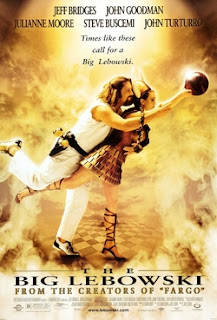In 1993, writer Irvine Welsh
shook the literary world to it’s core with his debut novel Trainspotting, a
frank depiction of a group of individuals in Leith, Edinburgh who are engaged
in recreational drug activity (most specifically heroin) and addictive
behaviour. It was on the longlist for the 1993 Booker Prize, but was purportedly
rejected from the shortlist for “offending the sensibilities of two judges.” In
1996, following on from their previous film Shallow Grave, a low-budget sleeper
hit, director Danny Boyle, producer Andrew Macdonald and writer John Hodge took
to adapting Welsh’s book in a fashion true to the spirit of the original source
material. Delivering an incredible breakout performance, Shallow Grave’s Ewan
McGregor is cast in the lead role of Mark Renton, and a perfect line up is
assembled to round out the rest of the gang. Ewen Bremner, Jonny Lee Miller,
Robert Carlyle, Kelly Macdonald, Peter Mullan and Welsh himself all play their
parts superbly. For all of the squalor and legitimately provocative things it
has say about drug addiction, urban poverty and the existential crisis’ in the
psyche of the disaffected youth in this particular period of time, the film is
incredibly entertaining. At around the ninety minute mark, this is an endlessly
re-watchable picture that despite containing some horrific moments, is also
outrageously funny and contains an extraordinary degree of dexterity. When it
was released, it was a runaway success, the equivalent of a Molotov cocktail to
the establishment, both in terms of the film industry and society as a whole.
All done to a rousing soundtrack, this was an energetic, heart-pumping pop
culture phenomenon the likes of which had never been seen before and perhaps
will never be seen again. It captures a particular and unique moment in our
history, our zeitgeist, and the universal connection that many of us have to
this film is a testament to its lasting strength and power.
Friday, 31 March 2017
The 8th Hall Of Fame Inductee Representing Comedic Film - The Big Lebowski (1998) - Joel Coen
Upon its initial release in
1998, The Big Lebowski, Joel and Ethan Coen’s follow-up to the critical and
financial success of 1996’s Fargo, was met with mixed reviews and a
disappointing take at the box-office. However, since then the film’s reputation
and status has grown exponentially, being seen by many as a quintessential cult
classic. The film features the offbeat, often surreal humour that we have come
to associate with the Coens, a collection of strange and wonderful characters
played by the likes of regular collaborators John Goodman, Steve Buscemi, John
Turturro, Peter Stormare and many more (namely Jeff Bridges iconic Jeffrey ‘The
Dude’ Lebowski), an eclectic soundtrack and a convoluted story that weaves together
the weird, the zany and a little mix of classic Hollywood noir. This is among
the strangest of strange detective stories, with our hapless, laid-back stoner
protagonist getting caught in all manner of shenanigans. Other collaborators
such as Carter Burwell and Roger Deakins each contribute greatly to the overall
creative process. It is a film whose lore and culture have emerged almost as an
entity in it’s own right. Beginning in Louisville, Kentucky in 2002, Lebowski
Fest, an annual festival devoted to the film, involves screenings of the
picture, contests involving trivia and costumes, musical performances and, of
course, bowling. The religion Dudeism was founded in 2005, devoted to spreading
the philosophy and lifestyle of the film’s main character. Indeed, I myself am
one who can counted among the over two-hundred thousand strong officially
ordained priests in The Church Of The Latter-Day Dude. It is a phenomenon that
can ultimately be attributed to the construction of a wonderful, self-contained
universe of infinite possibilities. This is what a work of true labor, love and
respect looks like. The Dude Abides, man…
The 10th Hall Of Fame Inductee For Contribution To Musical Composition - Dimitri Tiomkin
Despite being musically-trained in Russia, master composer and
songwriter Dmitri Tiomkin was once described by Gig Young in a 1956 television
interview as having written “the most American-sounding tunes you and I have
ever heard.” Indeed, in the case of High Noon (one of the many Westerns under
his belt, along with the likes of Duel In The Sun, Giant, Rio Bravo and The Alamo),
he is largely credited with saving the film. After the picture was poorly
received at preview screenings, Tiomkin purchased the rights to the theme song,
The Ballad Of High Noon, which, released as a single with singer Frankie Laine
would become a worldwide hit, precipitating the film’s successful release and
later canonisation into the pantheon of classic Westerns. Tiomkin would also
enjoy associations with directors such as Frank Capra, King Vidor and Alfred
Hitchcock. Lauded for his ability to weave his orchestral scores to fit the
story, themes and visual presentation of a picture, Tiomkin is rightfully
considered one of the great film composers.
Subscribe to:
Posts (Atom)


